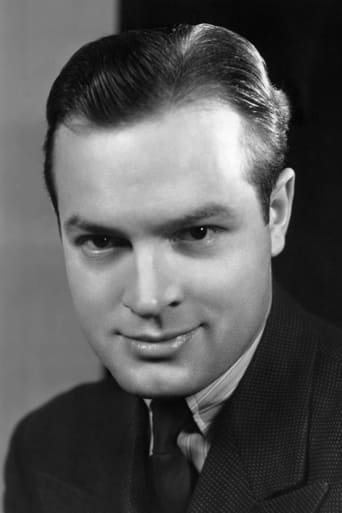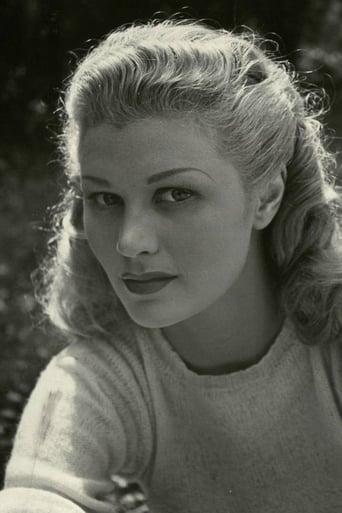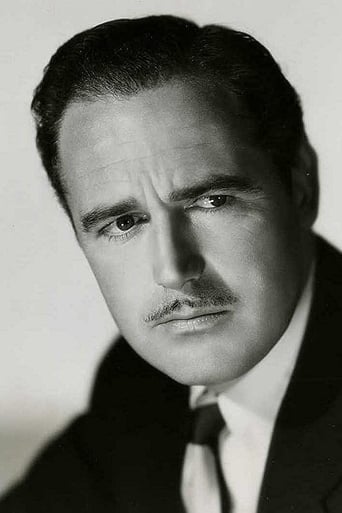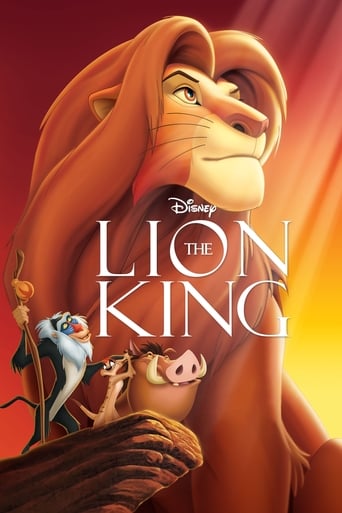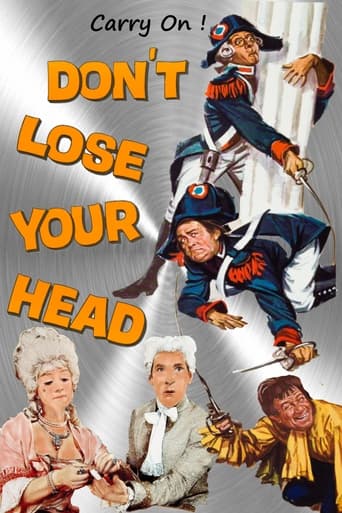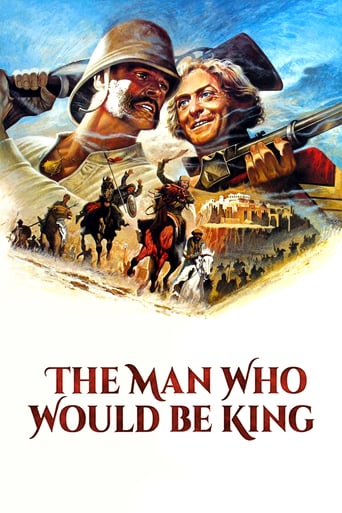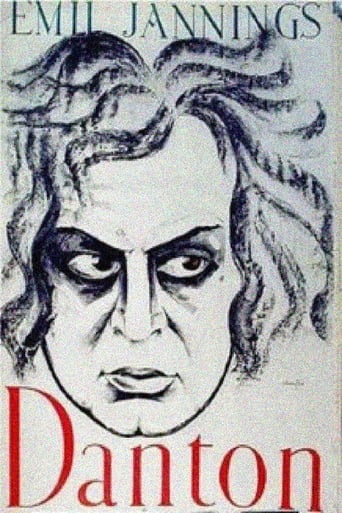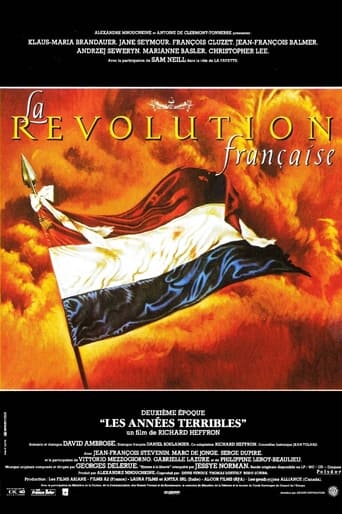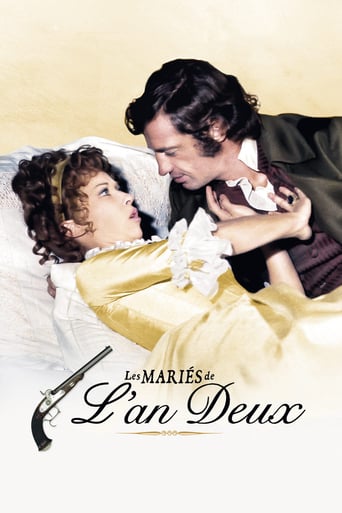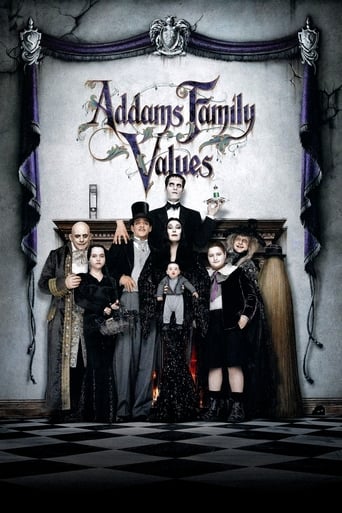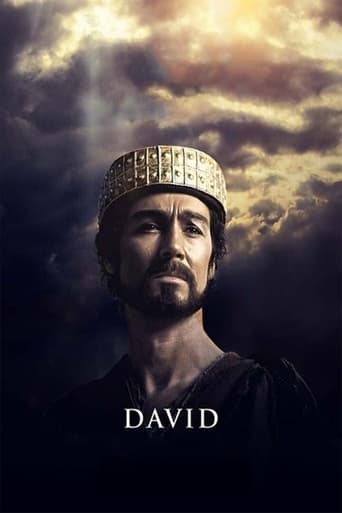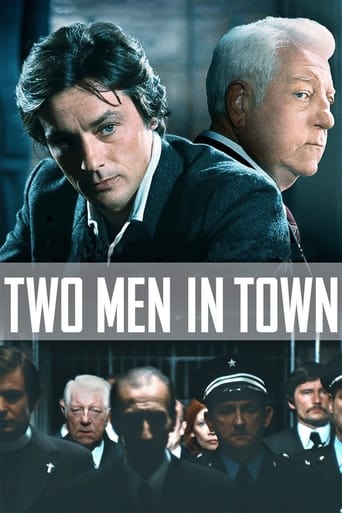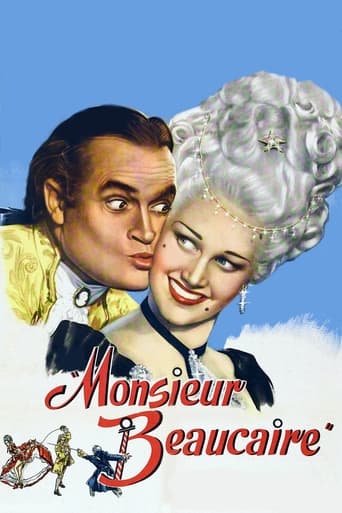
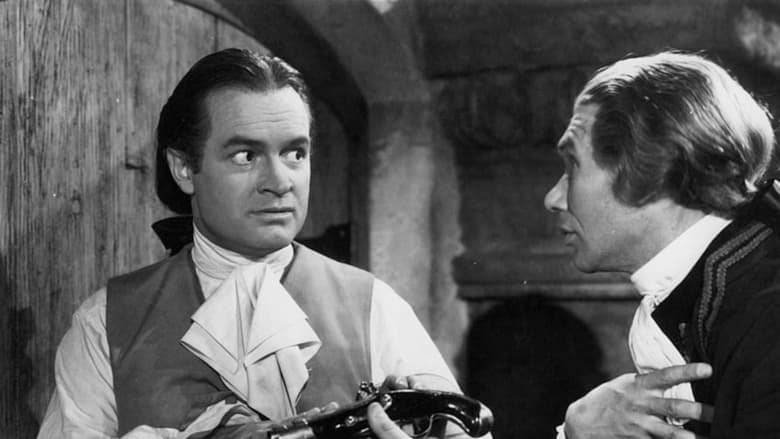
Monsieur Beaucaire (1946)
A bumbling barber in the court of King Louis XV becomes engaged in political intrigue when he masquerades as a dashing nobleman engaged to the princess of Spain.
Watch Trailer
Cast
Similar titles
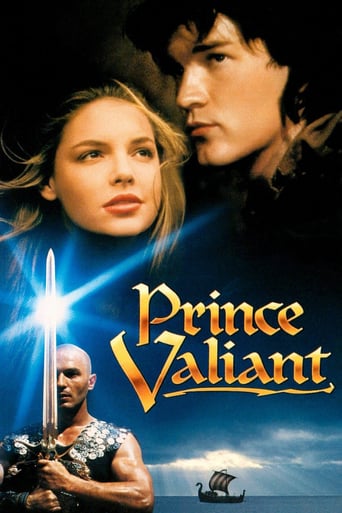
Reviews
Excellent, Without a doubt!!
This is one of the few movies I've ever seen where the whole audience broke into spontaneous, loud applause a third of the way in.
It’s not bad or unwatchable but despite the amplitude of the spectacle, the end result is underwhelming.
An old-fashioned movie made with new-fashioned finesse.
Foppish skewering of the Booth Tarkington novel, previously filmed with Rudolph Valentino in 1924, casts Bob Hope (in dryly engaging form) as a barber in the French Court of King Louis XV who inadvertently gets his chambermaid-sweetheart banished to Spain; he follows her there while impersonating the Duc de Chandre, a notorious ladies' man who is to be married in an act of patriotism to the Princess of Spain. Seems lengthy at 93 minutes, with a few peaks and valleys in the plotting, and yet it's relaxed and pleasant enough to be palatable to even non-Hope buffs. Still, ace screenwriters Melvin Frank and Norman Panama don't know when to quit, and even the funny tag at the end is ultimately spoiled by unnecessary silliness. A couple of nice songs by Ray Evans and Jay Livingston, a good production, and a funny duel (with Hope's ski-slope nose getting caught in the harp strings) make for a fitfully amusing time. ** from ****
Bob Hope had a great talent for making mediocre lines sound funny. Here the lines he delivers are actually as hilarious as his delivery.He actually does some quite decent acting in this one. The character of the barber Beaucaire is more romantic and less cynical than the comedian Hope.Hope has surrounded himself with some of the most talented people in Hollywood. Cinematographer Lionel Lindon was nominated three times for an Oscar and won once with "Around the World in 80 Days." Film Editor Arthur P. Schmidt was nominated twice (for "Sayonara" and "Sunset Blvd.") Composer Robert Dolan was nominated 8 times between 1942 and 1947. Sadly, he never won. He should have been nominated for this movie, but he was already nominated for "Blue Skys" in 1946. Art Director, Hans Dreier, was nominated 20 times and won 4 Oscars. He should have been nominated for this movie, but he already had two other nominations in 1946. Set Decorator, Sam Comer was nominated 22 times and also won 4 Oscars. Male Costume Designer Giles Steele got 4 nominations and won twice. Mary Kay Dobson. who did the exquisite gowns in this film, was never nominated, but she should have won an Oscar for the fantastic four foot wide hooped skirts the women wear.Hope was never nominated for an Oscar, but this is the one movie where I think his performance merited consideration.Joan Caulfield, in only her second film, is dazzling. As Mimi, Beaucaire's love interest, she is hilarious and has excellent chemistry with Hope. The same year, she played the love interest of both Fred Astaire and Bing Crosby in "Blue Skys". Everybody else in the cast is just delightful.The funniest scene is when Beaucaire meets the King of Spain. Beaucaire is pretending to be an aristocrat. He is told to act "distainful" When they meet, Beaucaire and the King just glare at each other through lorngettes (opera glasses).Second funniest is when Beaucaire gets exposed as a barber and slapped. The king tells him to slap the fellow back. "Everybody is entitled to his opinion," answers Hope meekly, "Why if I had a sword..." A lackey offers his sword to Hope, who quickly pushes him away, saying, "Mind your own business." If you're in the mood for a wonderful and sweet old romantic comedy, put across by some of the most talented people in the golden age of Hollywood, don't miss it.
Some current film fans with a perfunctory knowledge of cinema stars of the past will be shocked to learn that Rudolph Valentino and Bob Hope played the same title role in two different versions of Booth Tarkington's Monsieur Beaucaire. Of course you can believe there's a vast difference in the version.The Valentino version is a straight dramatic part about a Parisian barber in the court of Louis XV pretending to be a nobleman. Rudy was at his most romantic in the role and it was one of his biggest hits in the Twenties.Bob Hope's Monsieur Beaucaire finds Bob as a barber at Versailles in the court of Louis XV and worried about the romantic intentions of his sweetheart, scullery maid Joan Caulfield. Cole Porter wrote it best that Caulfield is true to Hope in her fashion, but she's an ambitious girl who knows what it takes to get ahead in the court. She aspires to be Madame Pompadour who is played here by Hillary Brooke.Due to a set of circumstances way too complex to write about, Hope and Caulfield both get themselves banished, mainly because of Hope's fantasies and both get themselves involved in the politics between France and Spain where a royal marriage is being arranged to the dismay of both participants, Marjorie Reynolds for the Spanish and Patric Knowles for the French.Playing the puppet-master in all the intrigue is Joseph Schildkraut who shows a real flair for comedy. His final duel with Hope ranks right up there with one Hope engaged in with Basil Rathbone in Cassanova's Big Night. Rounding out a wonderful cast of supporting players are Howard Freeman as the King of Spain and Reginald Owen and Constance Collier as the King and Queen of France. You don't doubt why Louis has Madame Pompadour around when you take one look at the Queen. By the way Joseph Schildkraut comes to one of the most satisfying ends a villain ever got in film. You'll have to see Monsieur Beaucaire and laugh all the way through to see what happens.
A "costume comedy" of the sort occasionally essayed by Bob Hope, this "version" of the Booth Tarkington novel is meant as a pastiche of the 1924 Rudolph Valentino film, but the one-liner master extraordinaire and his favourite scriptors, Melvin Frank and Norman Panama, can not resist going their own way, and a comically winning tangent it is. Splendidly directed by George Marshall, with top-flight cinematography and editing by Lionel Lindon and Arthur Schmidt, respectively, the action unfolds in the royal courts of 18th century France and Spain, nations on the verge of war. As the barber for King Louis XV (Reginald Owen), Beaucaire (Hope) finds himself in a situation where he must impersonate a nobleman, the Duc Le Chandre, or lose his head, whereas in the Tarkington original his impersonation is clearly of his own choosing. Meantime, in Madrid, conniving Don Francisco, commander-in-chief of the Spanish army, desires to prevent the upcoming marriage of the actual Le Chandre (Patric Knowles) with Spanish Princess Maria (Margaret Lindsay), by assassination if necessary, in order to destabilize the crown, leading to armed hostilities between the neighbouring countries and an opportunity for him to organize a coup. The false Duke, Beaucaire, becomes the prospective victim of this homicidal chicanery and we view him at his wedding ceremony where desperate measures must be taken to avoid being captured and then killed in quick succession. Hope's gags are beyond counting, some of them quite funny and all featuring his perfect timing, and a scene at the Spanish court that satirizes the use of the lorgnette by the nobility is classic, while there is pulchritude galore with three excellent actresses: Joan Caulfield as Beaucaire's true love Mimi, Hillary Brooke as Mme. Pompadour, and the lovely Lindsay, given her first role since Paramount picked up her contract. Also to be commended for their sharp performances in this fast-moving frolic are the swashbuckling Knowles, Schildkraut, Owen, Cecil Kellaway and Constance Collier, while Hope is supported for the first time by songs from Ray Evans and Jay Livingston, contributors to 11 subsequent films by the comedian, whose work here was Woody Allen's inspiration for the latter's LOVE AND DEATH.
